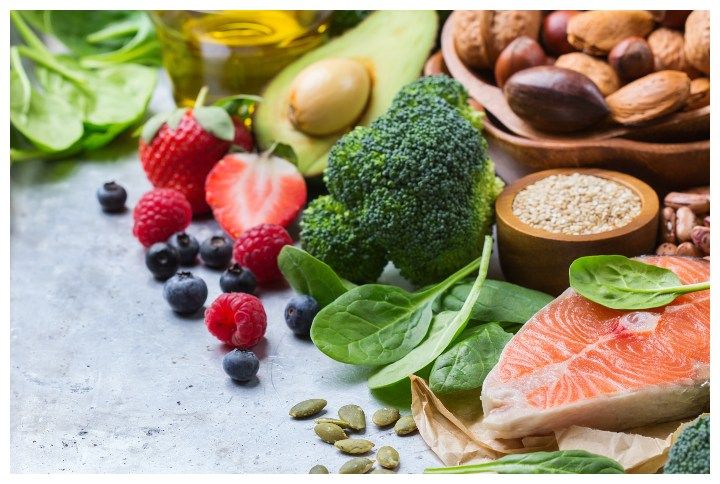Anxiety is your body’s natural response to stress. It’s a feeling of fear or apprehension about what’s to come next. However, when this feeling becomes chronic, lasts for longer durations, and starts interfering with your life, you may have an anxiety disorder.
Lifestyle changes like getting enough sleep and regular exercise can be helpful in dealing with anxiety. In addition, correcting a few food deficiencies and supplementing nutrients that are directly linked with brain functions, can do wonders too.
So, we reached out to Dieticians Kajal Wattamwar and Bushra Qureshi, Co-Founders of Healthy Steady Go, and asked them to share a few diet tips to manage anxiety. Read on to know all that they shared!

1. Magnesium
Magnesium is a nutrient known to give the feeling of calmness. A diet rich in magnesium can help improve brain functions, relieve stress, and make you feel calm. Some magnesium-rich foods are leafy greens such as spinach and Swiss chard, legumes, nuts, seeds and whole grains. A six-week course with magnesium supplementation has proven to significantly reduce anxiety symptoms.
Magnesium glycinate is often used for its calming effects to treat anxiety, depression, and insomnia. Although, if a person has low blood pressure, they must consult their doctor before taking these supplements.
2. Zinc
Zinc is a key player in making your neurotransmitters serotonin and dopamine, otherwise known as your happy hormones. Studies have shown that low levels of zinc are associated with oxidative stress, leading to lower levels of GABA (neurotransmitter), thereby leading to anxiety-like symptoms. Zinc supplementation helps here.
Foods rich in zinc such as cashews, liver, beef, pork, egg yolks and lamb have been linked to lower anxiety. Preclinical and clinical studies showed that zinc interacts with the serotonergic system and therefore enhances antidepressant-like effects.
3. Omega-3 Fatty Acids
Omega-3 fatty acids, which are usually derived from fish oil, have numerous effects in the body. Eating enough omega-3 fatty acids has been shown to help ease anxiety symptoms. Brain membranes contain a high proportion of these fats, and human studies suggest that a lack of omega-3s in the brain may induce various anxiety and depressive symptoms. The richest foods containing omega-3 fatty acids are fatty fish like salmon, mackerel, oysters, sardines and egg yolks. Vegetarians will have to opt for omega-3 or flaxseed oil supplements.
4. Probiotics
Mental disorders including depression and anxiety are often co-morbid with gut problems, suggesting a bidirectional relationship between mental health and gut function. A recent study suggested a link between probiotic foods and a lowering of social anxiety. Eating probiotic-rich foods, such as pickles, sauerkraut, and kefir, was linked with fewer symptoms. Pre-clinical study proved a link between the intake of fermented foods and gut-brain axis. Intake of fermented foods (probiotics and prebiotics) have been shown to relieve anxiety symptoms
5. Vitamin B
All B vitamins play a beneficial role in reducing anxiety and improving your mood. For instance, a study published in the Journal of Functional Foods found that people who ate B vitamin-rich foods saw great improvements in their anxiety and stress scores compared to those who didn’t eat B vitamin-rich foods.
Vitamin B and its derivatives are plentiful in animal products such as fish, lean meat, poultry, eggs, low-fat and fat-free milk, almonds and avocados. Fortified breakfast cereals also are a good source of B-12 and other B vitamins.
6. Antioxidants
Enhancing your diet with antioxidant-rich foods may help ease symptoms of anxiety disorders too. Antioxidant-rich foods include fruits like apple, prunes, cherries and plums; all the berries; nuts like walnuts, pecans, brazil nuts; vegetables like kale, spinach, beets, broccoli; and spices like turmeric and ginger.
7. Chamomile
A star herb that helps relieve anxiety is chamomile. It contains both antioxidant and anti-inflammatory properties, which may help lower inflammation associated with anxiety. Consume a good quality chamomile tea before sleeping for a good night’s sleep.
8. Cocoa
Another star food item containing flavanols, such as epicatechin and catechin, is cocoa. Some studies suggests that the flavanols found in dark chocolate may benefit brain function and have neuroprotective effects. They may increase blood flow to the brain and enhance cell-signaling pathways. These effects may allow you to adjust better to the stressful situations that can lead to anxiety and other mood disorders.
Follow @malinisgirltribe on Instagram for more content like this.

